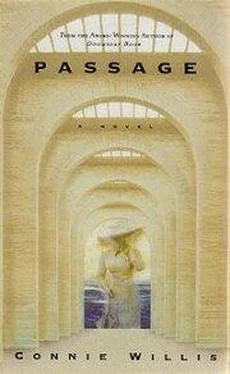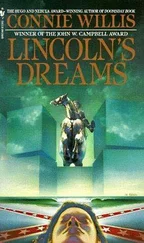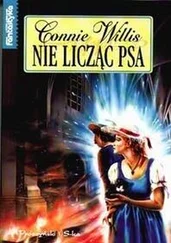Ulla. “Who are you?” Joanna asked, “what’s your name?” and waited, afraid, for the answer. Not Maisie. Please don’t let it be Maisie.
“I don’t know,” the little girl said, dandling the dog by its paws. “Can you do tricks, Ulla?” she said, and then to Joanna, “The dog at the circus could jump through a hoop. He had a purple collar. That color.”
She pointed, and Joanna saw that the sky had turned a pale, lovely lavender, and all around them, lavender-pink in the growing light, were glittering icebergs. “The ice field,” Joanna murmured, and looked down at the hyacinth water.
They were sitting on the grand piano from the A La Carte Restaurant, the wide walnut top with its curving sides floating steadily on the surface. A piece of sheet music still stood open against the music stand. “I guess pianos do float, after all,” Joanna said, and saw that the keyboard was underwater, the keys shimmering pale pink and black through the lavender water.
“There was a tuba at the circus,” the little girl said. “And a big drum. Is the Carpathia going to come save us?”
No, Joanna thought. Because this isn’t the Atlantic, in spite of the water, in spite of the icebergs, and even if it were, it was too late. The Carpathia had steamed up well before dawn.
The sun would be up any minute, staining the sky and the ice and the water rose-pink, and then flooding the east with light. The icebergs would flare into snowy brilliance. Maybe that’s what Mr. Mandrake’s subjects saw, Joanna thought. They believed it was an Angel of Light, but it wasn’t. It was the ice field, glittering like diamonds and sapphires and rubies in the blinding light of the sun.
“Jump!” the little girl commanded. She circled her arms into a hoop. “Jump!”
The bulldog looked curiously at her, his head to one side.
The little girl dropped her arms. “What will happen when the Carpathia gets here?” she asked.
The Carpathia isn’t coming, Joanna thought. It’s too far for her to come, too far for anyone or anything to come and save us.
“They check your name off on a list when you go on board,” the little girl said. She had taken off her hair ribbon and was tying it around the dog’s neck. “What’ll I tell them when they say, ‘What’s your name, little girl?’ ” She tied the hair ribbon into a bow. It was singed at the ends. “If you don’t know your name, they don’t let you on.”
It doesn’t matter, it isn’t coming, Joanna thought, but she said, “How about if I give you a name, like you named Ulla?”
The little girl looked skeptical. “What name?”
Not Maisie, Joanna thought. The name of some child who had been on the Titanic. Lorraine. But Lorraine Allison had gone down, the only child in First Class who had not been saved. Not Lorraine. Not the name of any child who’d died on the Titanic. Not Beatrice Sandstrom or Nina Harper or Sigrid Anderson.
The little girl who had been on the Lusitania who had gotten separated from her mother—what was her name?—the little girl the stranger had saved. “He threw her into the boat,” she could hear Maisie’s voice saying, “and then he jumped in, and they were both saved.”
Helen. Her name had been Helen. “Helen,” Joanna said. “I’m going to call you Helen.”
The little girl picked up the dog’s front paw. “How do you do?” she said. “My name is Helen.” She dropped her voice to a gruff bass. “How do you do? My name’s Ulla.” She let go of his paw. “Roll over, Ulla!” she commanded, “Play dead!”
The French bulldog sat, his ear cocked, not understanding. The wind that had sprung up as it grew light died down, and the water, already smooth as glass, became even smoother, but the sky did not change. It remained pink, reflecting its rosy light on the water and the ice and the polished walnut of the piano. “Stay!” Helen said to the unmoving dog, and they all obeyed, the sky and the water and the sea.
An eon went by. Helen stopped trying to teach the dog tricks and took him onto her lap. The wind that had sprung up as it grew light, died down, and the water stilled even more, till it was imperceptible from the pink sky. But the sun did not come up. And no ship appeared on the horizon.
“Is this still the NDE?” Helen asked. She had set the dog down and was leaning over the side of the piano, staring down into the water.
“I don’t know,” Joanna said.
“How come we’re just sitting here?”
“I don’t know.”
“I bet we’re becalmed,” Helen said, trailing her hand lazily back and forth in the still water. “Like in that poem.”
“What poem?”
“You know, the one with the bird.”
“ ‘The Rime of the Ancient Mariner’?” Joanna said and remembered Mr. Briarley saying, “ ‘The Rime of the Ancient Mariner’ is not, contrary to the way it is popularly taught, a poem about similes and alliteration and onomatopoeia. Neither is it about albatrosses and oddly spelled words. It is a poem about resurrection.”
And Purgatory, Joanna thought, the ship eternally becalmed, the crew all dead, “alone on a wide, wide sea,” and wondered if that was what this was, a place of punishment and penance. In ‘The Rime of the Ancient Mariner,’ a rain had come, and a breeze, washing away sin, setting them free. Joanna scanned the sky, but there were no clouds, no wind. It was still as death.
“How come we’re becalmed?” Helen asked.
“I don’t know,” Joanna said.
“I bet we’re waiting for somebody,” Helen said.
No, Joanna thought, not Maisie. Don’t let it be Maisie we’re waiting for.
“We have to be waiting for something,” Helen said, trailing her hand lazily back and forth in the pink water. “Otherwise something would happen.”
Something was happening. The light was changing, jagged peaks of ice going from pink to peach, the sea turning from rose to coral. The sun’s going down, Joanna thought, though there had been no sun, only the pink, even light.
“What’s happening?” Helen asked, creeping closer to Joanna.
“It’s getting dark,” Joanna said, thinking hopefully of the clear, shining stars.
Helen shook her head, her dark curls bobbing. “Hunh- unnh,” she said. “It’s getting red.”
It was, staining the water the red of sandstone mesas, the red of canyons. “It got red in the big top,” Helen said. “All around.”
Joanna put her arm around her, around Ulla, pulling them close, shielding them from the sky. “Don’t let it be Maisie,” she whispered. “Please.”
The sky continued to redden, till it was the color of fire, the color of blood. The red of disaster.
“It’s all right, little girl. You go. I will stay.”
—Last words spoken to Mary Marvin by her husband, Daniel, as he put her into one of the
Titanic’s lifeboats
Maisie was really good. She didn’t push the button on her pager, even though Dr. Wright didn’t come see her for a really long time.
After a whole week, she started worrying that maybe something had happened to him, like Joanna, and she asked Nurse Lucille to call him, she had a question about her pager she had to ask him, and Nurse Lucille told her he couldn’t come right now, he was busy working on something important, and asked her if she wanted to watch a video.
Maisie said no, but Nurse Lucille put in The Sound of Music anyway. She always put in The Sound of Music, every time. It was her favorite video, probably because she looked just like the wrinkly old nuns.
Finally, Kit came. She looked really pretty and excited. “Did Dr. Wright talk to Mr. Mandrake?” Maisie asked her.
Читать дальше












